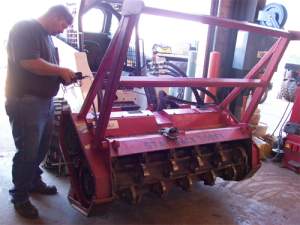A piece is said to be out of balance if its center of mass (center of gravity) does not coincide with its geometric center. The rotor weight bias causes this condition. The manufacturer balances most rotors after manufacturing and before they are used and assembled in their machine. Still, there will inevitably be some degree of unbalance in any rotating machine. However, the machine may vibrate over time or under certain conditions in the assembly process, requiring the components to be rebalanced.
Dynamic balancing is a technology that corrects imbalance errors in machinery and reduces vibrations that can cause catastrophic failure or create harmful centrifugal forces in the system interacting with the rotor.
- Their services minimize the impact on critical components such as bearings, seals, housings, pedestals and structures. Post-analysis is included to support the final results.
- Balancing is done on-site, so there is no need to disassemble the parts as they will report the speed of movement of the parts and the results.
- Dynamic Balancing denver work according to the standard ISO 1940. It is the same that guarantees the robustness of the machine and the processes.
Why balance the car?
Balancing and caring for your tires largely depend on the Dynamic Balancing Companies performance. Car tire balancing for the following reports. Just as alignment is essential in managing your vehicle and some of its systems, regular tire balancing is necessary to prevent tire deformation, noise and premature wear. Therefore, drivers need to understand that balancing their tires benefits the car and the driver himself. Well-balanced tires make driving fun and safe. Therefore, balancing tires every 10,000 km is essential for the safety of the vehicle and the driver.
Balance, the basic process
Balancing is a procedure for adjusting the weight of tires and rims to maintain the correct balance between them. There are two types of the counterweight: static, which puts a small amount of weight on the rim to compensate for the imbalance, and dynamic, which is extra weight on the wheel to increase grip. In static or rest equilibrium, the importance of the joint is evenly distributed about the axis of rotation, so the joint itself does not tend to rotate about the axis. The stably balanced, bearing-mounted wheel stays in place and stops in any position.
When unbalanced, the heavier part rotates towards the lowest point of the wheel and bounces back with each rotation, causing more wear at that point and a resulting vibration. Dynamic balancing also requires the unit’s weight to be evenly distributed along the tire tread centerline.
Signal
The fact is that the car sends specific signals when the tires need to be balanced. And this is:
- Vibration while driving.
- Difficulty turning in specific directions.
- Steering instability when driving in a straight line.
If the wear is on several parts of the tire. Balancing should take place approximately every 10,000 km or as follows:
- When changing tires.
- In the case of rotating tires.
- The first signs of the uneven tread.
- After decompression.
- After hitting the hoop hard.
Lack of tire maintenance not only shortens the life of your vehicle, but it can also put you and other road safety officials at risk. If your vehicle requires balancing or other proper maintenance procedures, please contact the experts at Dynamic Balancing Services.
What are the advantages of the new wheel balancer?
Technological advances in balancing machines have made it possible to use equipment that is not directly dependent on the skill and experience of the technicians in the workshop. This is possible thanks to the self-test and self-balance functions.
Automation or semi-automation in measuring and correction operations enables accurate wheel calibration. It also allows workshop technicians to perform smart, safe and easy operations.
In addition, there are accessories and accessories for the new generation of wheel balancers. These are useful and make balancing maneuvers more precise and comfortable. Some of the more popular accessories usually included with more advanced equalizers are:
- An external probe allows balancing operations independent of the technician’s skills.
- LED laser as a marker.
- The brake pedal not only helps to balance the work but also contributes to operational safety.
- Realistic screen visualization of imbalance.
Conclusions and recommendations
Dynamic Balancing is essential to balance with the right size wheel balancer for each wheel size and weight. Therefore, a precise and safe balance is guaranteed. For this reason, each workshop must research its target fleet. This allows you to determine your real needs and choose the best wheel balancer for your business’s services.
In addition, it is good to be aware of the different equalizer options available on the market. It is no exaggeration to say that the balancing quality corresponds to the measurement tolerance level of each piece of equipment. Only the most accurate range can correct displacements and eliminate vehicle vibrations.
Apart from this, if you want to know about Top AI Companies to Invest in 2023 then please visit our Business categry





